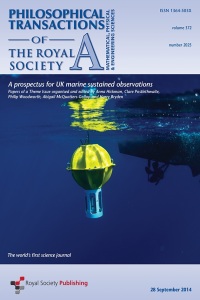The Challenger Society for Marine Science’s special issue of Philosophical Transactions of the Royal Society has been published! The special issue is entitled A Prospectus For UK Marine Sustained Observations and consists of papers arising from Challenger’s 2013 meeting of the same name, which was held at the Royal Society in London in September 2013. My two colleagues and I had the idea to organise the Prospectus while discussing the future of UK time-series data sets in this time of economic uncertainty. We teamed up with SCOR and the Royal Society and to deliver a brilliant one da y event celebrating the UK’s successes in marine monitoring. The three of us acted as guest editors for the special issue, reading and rereading each paper, chasing authors and hunting down reviewers. The process took nearly a year, but the special issue reflects the scope and passion of the Prospectus itself and it’s incredibly satisfying to finally see it in print (yes, print – the Royal Society sent me an actual hard copy!). I particularly love the introductory paper ‘Sustained UK marine observations. Where have we been? Where are we now? Where are we going?’ by SAHFOS director Prof Nicholas Owens. It’s a conversational look at the history of sustained observations in the UK, dating back even earlier than Stonehenge. It’s not your normal scientific paper! I hope you’ll check out our special issue – if you are at #Challenger2014 you’ll find an advert in your delegate bag.
y event celebrating the UK’s successes in marine monitoring. The three of us acted as guest editors for the special issue, reading and rereading each paper, chasing authors and hunting down reviewers. The process took nearly a year, but the special issue reflects the scope and passion of the Prospectus itself and it’s incredibly satisfying to finally see it in print (yes, print – the Royal Society sent me an actual hard copy!). I particularly love the introductory paper ‘Sustained UK marine observations. Where have we been? Where are we now? Where are we going?’ by SAHFOS director Prof Nicholas Owens. It’s a conversational look at the history of sustained observations in the UK, dating back even earlier than Stonehenge. It’s not your normal scientific paper! I hope you’ll check out our special issue – if you are at #Challenger2014 you’ll find an advert in your delegate bag.
And that brings me to another exciting Challenger development – this week is the biennial Challenger Society for Marine Science conference and Plymouth is hosting! If you don’t know, Challenger is a learned society which acts as the voice of the UK marine science community. Every two years Challenger puts on a huge scientific conference; uniquely, the Challenger conferences focuses on early career scientists, with 75% of presentations and posters delivered by PhD students or those within only a few years of receiving their PhD. Even most of the chairs and key note speakers are early career scientists and there is an early career networking event on Wednesday afternoon. I love being involved in an organisation that supports early career scientists – I’m grateful for the mentoring and support I’ve had in my career and I want up-and-coming scientists to receive the same benefits.
Because the conference is in Plymouth and because I’m on the Challenger Society’s governing council, I’m also on the conference’s local organising committee. We’ve spent almost two years putting together this event and it’s great to see that nearly 300 delegates have registered. On Tuesday morning I’m chairing a session entitled ‘Marine Policy – Challenges and Tools for Managing Marine and Coastal Resources’. My colleague Jennifer Skinner is presenting our recent work on ‘What value does taxonomy have in modern science and policy?’, a topic close to my heart due to my role at SAHFOS. I’m also presenting a poster in my session (board number 60 – come check it out). I’m particularly excited about Tuesday night’s Plymouth Medal Lecture which will be delivered by Prof Ian Boyd – Defra’s chief scientist. It’s not often that a headline talk at an oceanographic conference is about the science-policy interface! I’ve also got friends presenting keynotes, one of my students is a volunteer, SAHFOS colleagues are presenting posters and talks, and we’ve organised some great social events. We designed the traditional Wednesday night Challenger conference pub crawl route today at registration – and it will be awesome. I’m proud to show off Plymouth and I’m proud to be a part of Challenger. This is going to be a great week!
Have a top #Challenger2014!
